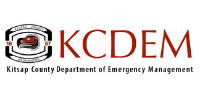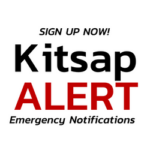- Take care of your loved ones. Check for injuries.
- Dress for safety. A bicycle helmet or hard hat protects from falling debris. Sturdy shoes protect from broken glass. Leather gloves protect from sharp objects. Check home for falling debris/hazards.
- Check the propane at your home. Shut off, if necessary, to prevent fires!
- Shut off water at the house main to trap clean water in your home. If water lines have broken, this will keep pollutants out of possible drinking water (ex. your water heater or upper toilet tank.)
- Place the HELP or OK sign on door or window most visible from street or driveway. Posting sign helps neighbors locate those who need help first. This sign could be provided at neighborhood meetings, but you can create your own using an 8½x11 sheet of paper. HELP in bold on one side; OK in bold on the other side (or on a separate sheet.) Prepare sign ahead of time and consider placing some tape with it.
- Tape down toilet lids & seats to prevent usage. Shaken ground means that sewage lines could be broken. Initiate a “2-bucket poo system.”
- Go to the neighborhood gathering site established during neighborhood meetings. If not established, gather in a protected area (covered porch, open garage) that is easily seen. This will help you get organized and reduce confusion. Take First Aid kits, transistor & CB radios, cellphones, neighborhood booklet, pen; flashlights if dark.
- Form Teams at the Neighborhood Gathering Site. A leader is designated and will operate the CB radio, if available. The leader remains at the gathering site to relay information to Command Post.
a) Team 1 will listen to the Emergency Alert System (AM/FM radio KMAS 1030AM; 103.3FM), or to a NOAA Weather Radio and keep neighbors informed of what they learn.
b) Team 2 will check on neighbors who are elderly, those with a disability, or homes where children or pets may be alone. Identify any immediate medical needs, take notes, and report to leader.
c) Team 3 will check all propane tanks and shut off the gas only if necessary.
d) Team 4 will check on all homes with the “HELP” card displayed on door/window, or no card showing. Perform a basic assessment of medical needs for each person; take notes & report to leader. Be prepared to give 1st Aid. Take notes on structural concerns.
-Trust your instincts. If something looks or feels unsafe, stay out! - Teams return to a neighborhood gathering site. Update your neighbors on tasks completed. Determine need and availability of equipment and skills (chainsaw, ladder, lighting, ropes, fire extinguishers, generator, etc.) The leader will report this information to the Command Post via CB radio, or ‘runner’.

